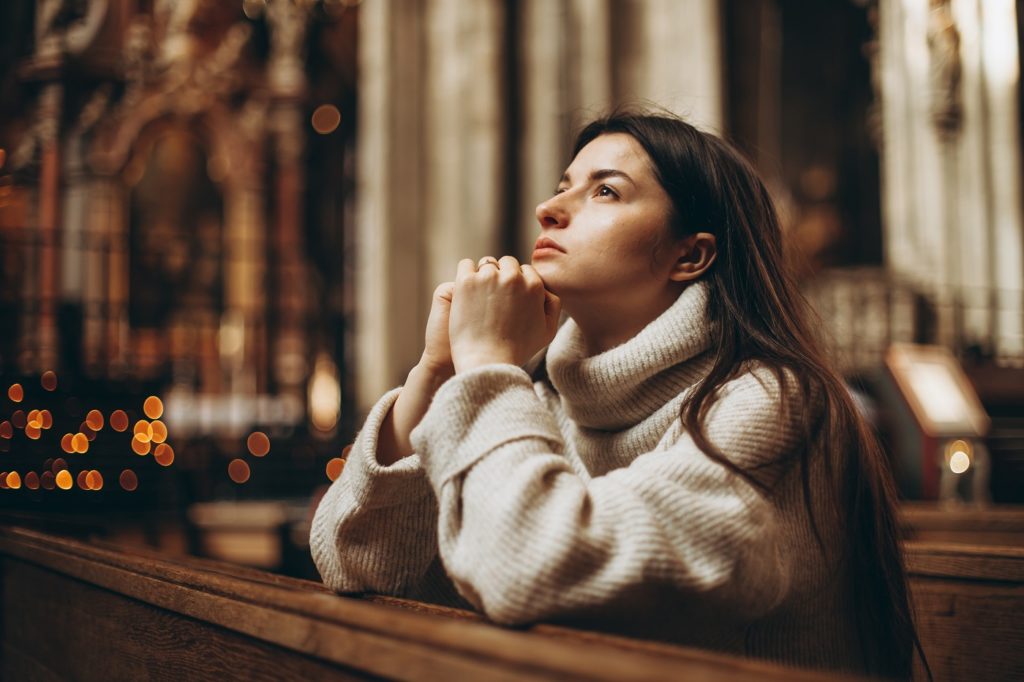Going to church in our times is a complicated affair. Early on in the pandemic, the Church took a strong prudential tack, following governmental regulations to close churches to Mass attendance for weeks. Slowly, however, life crept back into our parishes, though in a way unimaginable last year. Enmasked, with various printed indicators demarcating assigned seats, we sit scattered throughout our churches, separated by a “spacing” pew marked off with construction tape. Often, we receive Jesus in the Eucharist only after the final prayers of the Mass, sometimes at the back of the Church—or even outside. This is all strange and certainly there is a healthy conversation to be had about which of these measures are really necessary and which are not, especially as our knowledge of the plague gradually increases.
But that will not be the topic explored here. My aim is much simpler. Why, in the midst of this crisis, has general access to our houses of prayer been continually thwarted and stymied? Surely, “the source and summit of the Christian life” should be available when it is most needed? Why, in a time when the Church’s most precious possession is needed the most, must the faithful still be struggling to access a tabernacle? It is important to note that, while my argument is biased towards Catholic Eucharistic theology, any religious group with a similar theology or valuation of sacred spaces falls under its purview. My aim here is too general to get into the fine distinctions of which path various parishes and dioceses have taken. No doubt it varies quite a bit, as I have experienced both anecdotally and from reporting. In the UK, at least, most parishes were inaccessible outside Masstime, which itself was terminated at the beginning of November with a second national lockdown.
Why, in the midst of this crisis, has general access to our houses of prayer been continually thwarted and stymied?
In his final papal encyclical, Ecclesia de Eucharistia, Pope Saint John Paul II wrote about the importance of prayer in the presence of the consecrated Host. His words strike a tone of urgency, even in a pre-pandemic world. As he says, referring also to his personal reliance on the Eucharistic Presence, “If in our time Christians must be distinguished above all by the ‘art of prayer,’ how can we not feel a renewed need to spend time in spiritual converse, in silent adoration, in heartfelt love before Christ present in the Most Holy Sacrament? How often, dear brothers and sisters, have I experienced this, and drawn from it strength, consolation and support!” He notes also that the practice has been held up by saints throughout the generations. Saint Alphonsus Liguori went so far as to say, “Of all devotions, that of adoring Jesus in the Blessed Sacrament is the greatest after the sacraments, the one dearest to God and the one most helpful to us.” According to this saint, after the sacraments, prayer in the presence of the Eucharist is the next best thing. In short, praying in the Real Presence is one of the greatest means of grace in the Christian life.
Start your day with Public Discourse
Sign up and get our daily essays sent straight to your inbox.The Church teaches unashamedly the centrality of the Eucharist to the Christian life. The Second Vatican Council’s Lumen Gentium employs what is perhaps the most elevated language, famously naming the Eucharist “the source and summit of the Christian life.” We do not have to look far to find reason not only to receive the Eucharist as often as we can, but likewise to benefit from the graces of simply being in Its presence. As St. Josemaría Escrivá quipped, concerning a general attitude of Eucharistic devotion, “As you make your usual way through the city streets, aren’t you happy when you discover another tabernacle?”
So what are we to make of these admonitions in today’s context when, more often than ever before, encountering a tabernacle in the streets means encountering locked doors? How are we to interpret the Church’s timeless teachings on the centrality of the Eucharist when our ability to make “the Visit” is systematically prohibited?
No doubt, concerns about the spread of the coronavirus are the surface-level explanation for the persistent inaccessibility of our churches. If this rationale is the explanation, however, we are still in a place to ask two clarificatory questions. First, is it the case that solitary, silent prayer with proper social distancing in large buildings actually, demonstrably causes the spread of COVID-19? Second, even granting the negligible risks involved, can we say that the benefits of safety gained by locked churches outweigh the spiritual goods that the Church attaches to Eucharistic devotion?
First, is it the case that solitary, silent prayer with proper social distancing in large buildings actually, demonstrably causes the spread of COVID-19? Second, even granting the negligible risks involved, can we say that the benefits of safety gained by locked churches outweigh the spiritual goods that the Church attaches to Eucharistic devotion?
Regarding the first, we might imagine what the day-to-day occupancy of a parish open for prayer looks like in reality. Perhaps a hypothetical parish on the smaller side has an estimated capacity of no more than thirty individuals, all maintaining the proper six-foot berth. If a church is open for private prayer at the times when there are no Masses, it is highly improbable that this limit would ever be reached. One might suggest that it is never possible to be certain that capacity might be reached. If over-capacity during private prayer really is a pressing concern, then it seems a sign-up process—as is currently in place for many Masses—would easily assuage concerns.
Regarding the second question, given the Church’s unequivocal endorsement of Eucharistic prayer, it seems that the prerogative rests on those with health and safety concerns to articulate why such concerns necessitate closed churches. Given that Masses are underway again in most dioceses, a fortiori the much less demanding opportunity for private prayer and all its concomitant benefits should be permitted. One might finally urge that sanitation becomes a problem once individuals are allowed inside a church unmonitored. Again, the solution does not seem too far afield. Just as we expect good citizens to wash their hands in the restroom and throw away personal litter, we can easily ask the faithful to wipe down areas of contact.
Unless I am missing some complicated calculus in these simple solutions to potential problems, I do not see why our churches remain at best elusively open for private prayer. In fact, given the spiritual benefits of Eucharistic prayer, bishops and priests should be doing all they can to ensure the faithful have access to churches. Now more than ever, we need this grace as we cry out with the Psalmist: “Take away your plague from me; / I am ravaged by the touch of your hand” (39:11).
Turning again to St. John Paul II’s encyclical, we even hear that the Church’s shepherds have a unique duty to encourage the faithful to pray in the presence of the Eucharist. He states, “It is the responsibility of Pastors to encourage, also by their personal witness, the practice of Eucharistic adoration, and exposition of the Blessed Sacrament in particular, as well as prayer of adoration before Christ present under the Eucharistic species.” How can a priest witness to this devotion if the church doors are interminably locked? Failing such practices and such exemplification, pastors fail in their responsibilities of leadership to the congregation entrusted to them.
In a recent book of some influence in Catholic circles, an anonymous Benedictine monk records the words he hears Christ speaking to him in Eucharistic adoration. Roughly once a week, the monk receives “locutions” from Christ, which have ultimately led him to establish a monastery dedicated to adoration on behalf of the priesthood. As he relates his intense prayer experiences throughout In Sinu Jesu, the monk writes, “The Most Holy Eucharist is not only My Sacrifice offered to the Father, . . . it is also the Sacrament of My divine friendship, the pledge of My burning desire to remain close to all who seek Me, to all who need Me, to all who would spend time in My company.” Placing the sacrament in its theological context, these words also emphasize its importance for the faithful as a means to friendship with God.
But he gets more explicit: “This is why it so grieves Me that churches are locked and that I am left for days on end alone in the tabernacle. I would draw souls to My open Heart, I would have them experience what it is to abide in the radiance of My Eucharistic Face, I would give Myself in intimate friendship to souls drawn to Me in the Sacrament of My love, but you priests, shepherds of souls, have forgotten that keeping open your churches is integral to your sacred ministry.” He concludes, “Open the doors of My consecrated houses and trust Me to fill them with adorers in spirit and truth!” Simply opening the doors of their houses of worship is integral to priests’ sacred ministry.
In many ways, the urgency of these words is only stronger now than it was previously. The ability to pray in front of a tabernacle is more pressing now, not less. Given the Church’s many explicit admonitions that we turn to the Eucharistic presence, Christ’s words through this mystic should come as no surprise. Until there is demonstrative evidence that the practice of private prayer actively spreads the virus, the imperatives to Eucharistic prayer still stand. As Archbishop Nichols queried of the UK government before the recent lockdown, “We ask the government to produce this evidence that justifies the cessation of acts of public worship.” The same applies to private prayer. Since prayer in the presence of this sacrament is an unequivocal priority, the burden of proof showing the necessity of measures inimical to such prayer rests with those advocating church closure. Locked church doors need a justification, not the other way around.













